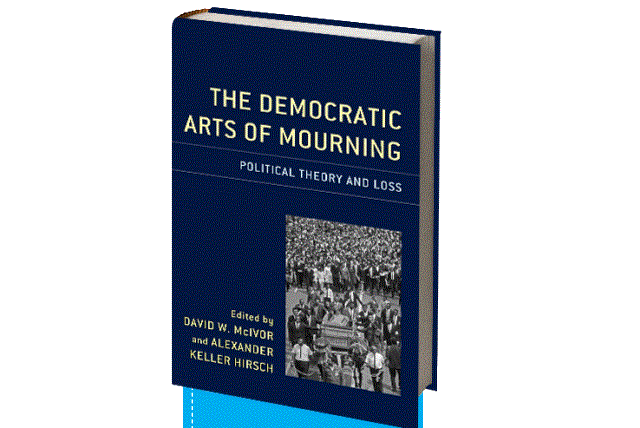
The Democratic Arts of Mourning reflects on the variety of ways in which mourning affects political and social life. In recent decades, political theorists have increasingly examined and explored the themes of loss, grief, and mourning.
With an introduction that contextualizes the turn to mourning in previous scholarship on the politics of tragedy, this book includes twelve chapters that clarify the intertwinement between politics and mourning. The chapters are organized into five thematic sections that each shed light on how democratic societies relate to loss, grief, suffering, and death.
Collectively, the chapters explore the concept of mourning and its relationship to civic rituals, memorials, taboos, social movements, and popular music. Chapters examine how social groups defend their members against experiences of grief or mourning, or how poetic expressions—such as ancient Greek tragedy—can address the catastrophes of human life.
Other chapters explore the politics of symbols and bodies, and how they can become fraught objects that stand in for a society’s undigested—unmourned—losses and absences. The book concludes with an interview with Bonnie Honig, whose own work on mourning has been deeply influential in contemporary political theory.
Industry Reviews
Art and faith traditions across the world have long acknowledged that suffering is a part of life and have offered ways of mourning loss, finding solace, and achieving reconciliation. Episodes and histories of human suffering have also provoked searching questions about the nature of agency, the limits of responsibility, and the redemptive power of public remembrance which continue to inform (and sometimes inflame) political debate and discussion. The Democratic Arts of Mourning assembles insightful and thought-provoking analyses of the significance of mourning for democratic politics from a variety of theoretical standpoints (e.g., Freud, Adorno, Judith Butler) and in relation to controversies around appropriate public responses to historical injustices and contemporary episodes of profound loss. For readers interested in understanding better how social movements coalesce around demands for public acknowledgment of past injustices or present atrocity, how officials facilitate or circumvent the public work of mourning, or how activists and creative artists invite reconsideration of who we are through reflection on what we have suffered (or allowed others to suffer), this volume merits serious and sustained consideration. — Robert Pirro, Georgia Southern University
This wonderful collection of essays demonstrates compellingly how mourning inflects contemporary politics. Exploring the way grief is always both personal and political, and how mourning involves retrospective reckoning as well as futural aspirations about what could be, the chapters collected here provide a loving and generative testimony to J. Peter Euben’s insight that “political theory begins with loss.” This book will prove invaluable to scholars seeking to understand what the “turn to mourning” in democratic theory looks like and entails. But with beautifully written essays addressing a wide range of topics, The Democratic Arts of Mourning makes excellent reading for anyone living in the world today who seeks to contend with the psychic and material losses – and hopes – of our time. — Sara L. Rushing, Montana State University
In The Democratic Arts of Mourning, loss is a foundational experience for democratic politics and political theory. The fantastic essays in this book grapple with mourning as both a public and private experience, addressing issues as timely as the Black Lives Matter movement, mass violence, and indigenous land protests alongside biblical stories and ancient Greek tragedy. McIvor and Hirsch have assembled a brilliant debate on the power of mourning in democratic practice today. — Elisabeth Anker, George Washington University
A wide-ranging, meditative collection of essays that explores the varied and volatile political meanings of mourning. The essays subtly probe the complex relationship between political loss and democratic resilience — and when to resist the ambivalences of mourning, and to seek the sharp clarity of disruption, threat, and refusal. The unease of these two possibilities sears through the volume, and makes it resonate with the political ambivalences and anger of the contemporary moment. — Nancy Luxon, University of Minnesota-Twin Cities
****
 The Independent Uganda: You get the Truth we Pay the Price
The Independent Uganda: You get the Truth we Pay the Price



